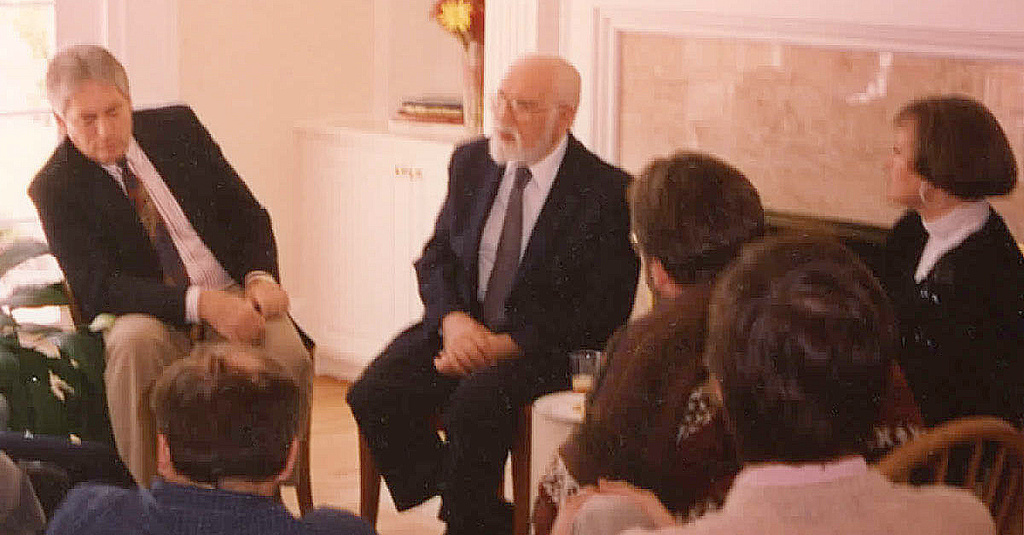
Moving Men to Faith and Action: The Simple Mission of Chalcedon
One could mark the beginning of Christian Reconstruction with the starting of the Chalcedon Foundation in 1965, but as you know, the idea of the victorious Kingdom of God in history is hardly a new concept.

- Chalcedon Editorial
One could mark the beginning of Christian Reconstruction with the starting of the Chalcedon Foundation in 1965, but as you know, the idea of the victorious Kingdom of God in history is hardly a new concept. Still, Christian Reconstruction is identified primarily with the works of R. J. Rushdoony, and to date, much of what others wrote over the ensuing years are extrapolations of his work on the law of God and the application of the faith.
Rushdoony would have it no other way. He saw his work as “scratching the surface,” which meant he anticipated others would carry the torch:
For me theology means the total mandate of God through His word. What I have written only scratches the surface; it is an introduction to the subject, and it is written to move men to faith and action.1
As a scholar, his mission was simple: “to move men to faith and action,” and as we know, scholarship and academia can be anything but simple. The end result of that complexity is a great divide between the academy and the pew while we who might be “well read” end up decrying the lack of strong doctrine amongst evangelicals. Rushdoony understood this, so many of his books were first delivered orally to small groups of layman who then asked questions which Rushdoony used to revise the chapters he would later write. The believer’s application of the faith was always in his mind.
Christian Renaissance
One might find it surprising that the idea of the victory of God in history would be something Christians would oppose. We can certainly understand the resistance of the unbeliever to the rule of Christ in history, but the believer? Much like the person living with a house full of cats, we can acclimate ourselves to the stench of defeat.
In the middle of the turbulent 1960s, right after a significant conservative presidential defeat, Rushdoony launched the Chalcedon Foundation espousing right out of the gate a vision far grander than a single scholar could represent. At the outset, as he wrote in his first letter to his supporters, he saw his initial target as “humanism and its statism,” and that the answer is Christian faith and liberty:
What you are doing, in support of me, is to sponsor a counter-measure to the prevailing trend, to promote by your support, interest, and study, a Christian Renaissance, to declare by these measures your belief that the answer to humanism and its statism is Christian faith and liberty.2
Notice he said, “support, interest, and study.” Once again, his concern was to equip the laity, and that could only be achieved through Christian education, i.e., providing laymen with strong Christian books that deliver the massive idea of the victorious Kingdom of God in history.
Religion of Revolution
In many ways, we are living through a similar time as the mid-1960s, and now over half a century later, there is no need to revise Chalcedon’s mission, message, or publications. If anything, you might better understand why publishing and re-publishing play such an important role in the work we do today.
As an example, we’re currently working on compiling and editing an upublished manuscript by Rushdoony on The Religion of Revolution which speaks directly to the subversive forces we see today operating in universities, government, media, and churches. As we know, there is nothing new under the sun (Ecclesiastes 1:9), so a manuscript written so many years ago will sound as if it was written recently—a frequent comment about Rushdoony’s books.
These manuscripts are labor intensive beginning with the fact that many were discovered after Rushdoony passed in 2001, and we have to ensure that we have all the chapters necessary for a complete work. Then, pages of hand written text must be typed up and initially proofed before being organized into an outline of a book.
From there, a technical reading needs to be done, and that task is usually given to our resident scholar and vice-president Martin Selbrede. He is the foremost expert in Rushdoony’s writings as well as a brilliant editor and proofer who will chase down footnotes with a passion. Martin has played a central role in helping us publish the most excellent versions of our catalog, and the majority of the time he’s invested has been voluntary and without sufficient compensation.
As a side note, we are still encouraging supporters to be as generous as they can with their giving so that we might have Martin’s full time devoted to the scholarship Chalcedon desperately needs. We believe Rushdoony’s books are of utmost importance, but we believe Chalcedon should be engaging current topics so that this ministry can speak more directly to our times.
The “Hard Sell”
As mentioned above, the central work of the Kingdom of God will come down to individual Christians investing in personal study so that they can apply their faith and encourage others to do the same.
Until now, Christian Reconstruction has been a hard sell to the wider church because Christians struggle with the idea of victory for the church in history prior to the return of Christ as well as the responsibility that such a vision requires. Therefore, the better we can equip laymen to contend for the faith, the greater influence they will have on the culture around them. What’s important to note is that the culture is changing so rapidly that the ideas within Christian Reconstruction don’t sound as radical as they once did. The antinomianism in the church has led to moral compromise, and this helps to present a case for theonomy. The cultural decline without revival, rapture, or political victory forces Christians to consider the creation of a Christian social order.
In other words, as the flood waters of evil creep ever closer to the doors of the average evangelical, the more they’ll realize they don’t have the worldview necessary to contend with the storm.
The Tithe is the Key
The decline of culture is more serious than an opportunity to reach more people, and this is where educated believers must be prepared to act. Rushdoony wrote often about the need to utilize the Christian tithe in order to finance Christian Reconstruction, and by that he meant alternative forms of government, education, and charity.
Obviously, we see this clearly in the Christian school and homeschool movements. Whereas our detractors accuse us of seeking to take control of the powers of civil government, Christian education represents “taking back” government by way of self-government. We did not take over public education. We obeyed God by teaching our own children regardless of the extra expense and effort that was necessary. This is why Christian responsibility has always been a hard sell, but society is now at a stage in which families are removing their children from public schools in record numbers.
People are learning that the only way to best ensure the health and safety of their families is by personal responsibility, and that means a restoration of Christian faith and liberty.
Small but Powerful
Within all communities there should be an expansion of this tactic as we look for new ways to take back government, health, justice, charity, and more. This is why God gave us the power of the tithe. It is a means to financing the work of Christian Reconstruction, and it is the primary way we work outside the current system in order to better serve the Christian community.
We can all do as Rushdoony did and work with small groups and individuals, but that means becoming as equipped as we can be, and that’s where the Chalcedon Foundation comes in.
Chalcedon is still a small ministry with big ideas, but our mission is a simple one: we want to move believers to greater faith and action, and we need your continual support to do that. Please continue in your prayerful and financial support of this ministry. Its importance cannot be emphasized enough.
1. R. J. Rushdoony: Systematic Theology in Two Volumes (Vallecito, CA: Ross House Books, 1994), p. xv.
2. R. J. Rushdoony: Faith & Action: The Collected Articles of R. J. Rushdoony from the Chalcedon Report, 1965-2004 (Vallecito, CA: Chalcedon/Ross House Books, 2018), p. 1202.

- Chalcedon Editorial